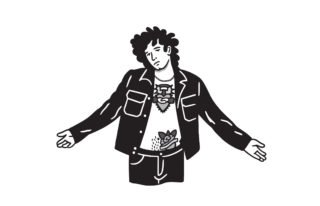Music is a strong weapon to fight climate change, even if it means sticking up for The 1975
The Climate Crisis is too big to reduce to a pissing contest

The Climate Crisis is too big to reduce to a pissing contest
The brass of David Davies – Conservative MP for Monmouth, arch-Eurosceptic, climate change denier and definite fucking goon – writing to The 1975 to accuse them of environmental hypocrisy really got under my skin. Putting aside my personal dislike of that band, there was something extra-toxic about Davies’ little note.
His tone set off the first alarm bell. From the quotation marks around ‘climate emergency’ near the beginning, to the risible postscript, daring the band to ask “Extinction Rebellion to block the roads in the cities where you play so that we can be certain nobody travels to one of your concerts by car”, the whole thing is dripping with the smirking, prefect-getting-the-boot-in condescension that so often characterises Tory vernacular. You can practically hear him tittering at his own brilliance as he dictates the letter to a fawning underling. Never mind that, now you say it, encouraging fewer people to drive to gigs might actually be a good thing; never mind that the value of having a band with such an enormous platform spreading these messages is considerable, and just maybe the personal actions of the messenger do not invalidate the message. Don’t worry about those things, David: as long as you get one over on the luvvies, the context is immaterial.
Get past the rugby club one-upmanship, and things don’t improve much. Bear in mind, this is a man who has repeatedly used his parliamentary profile to dismiss the mountains of evidence for our contribution to climate breakdown, mangling research in order to ‘prove’ his reactionary points. The fact that he’s even considered using words like ‘hypocrite’ in his letter given his own laissez-faire attitude to truth and principle tells you all you need to know. He is, after all, yet another libertarian enemy of the welfare state who was rather embarrassingly caught with his hands in the public purse during the expenses scandal – though he emerged from the ensuing scrutiny legally unscathed, a man who claims two grand from the taxpayer to and pays it into his family business while consistently voting to reduce government assistance of society’s poorest is on thin ice indeed.
We know it’s near-impossible for progressive arguments to be effectively made on the home turf of the reactionary, so it feels increasingly important to approach this issue with a positive outlook, a persuasive counter to the politics of fear that have played no small part in bringing us to this point. This seems as applicable to the music industry and its attendant community as it does anywhere elsewhere. We’re all in the same boat.
Yes, obviously we should all try to limit our flights and reduce our carbon footprint. Obviously going on a world tour and guzzling fossil fuel-generated power isn’t going to directly benefit the planet. But as we know, thanks to the inaction, diversion and dishonesty of infinitely more culpable agents in the climate crisis than one rock band – don’t forget, just 100 corporations are responsible for over 70% of the world’s carbon emissions – unless vested interests can see a fiscally attractive alternative to their current MO, they’re not going to replace it.
More time needs to be spent arguing that a carbon-neutral world is not only existentially necessary, but can be materially better than the world we live in now, both on an individual level and in the public sphere. Leave the politics of fear to the reactionaries: there are effective, optimistic arguments to make about the reality of clean air, synthetic meat, renewable energy, and worldwide environmental action with benefits far beyond the elite of the global north. That’s not remotely to say we should play down the dangers of climate breakdown: simply that the benefits of a post-carbon future are real, and must be communicated.
I’ll let the experts make those big arguments, but I do feel it’s important to highlight what can be done by musicians and music lovers to contribute here. Systemic change requires society-wide action, building the alternative from the ground up. We can all contribute to that.
All the usual applies – drive less, fly less, eat less meat, don’t buy palm oil – but there are some music-specific initiatives that we should all be supporting. FEAT in Australia was started by a collective of musicians to invest in solar farms; increasing numbers of music events are going plastic-free and carbon-neutral, as well as encouraging their attendees to use more efficient means of transport; Clean Scene offer an easy-to-use carbon offsetting tool to members of the dance music community, making vital offsetting technology more widely accessible. There are many others, and they’re all doing essential work.
All these things are small and specific, but if we’re to win the argument on climate change these kinds of measures – which do not deny us luxuries, but instead mitigate their ill-effects and provide positive alternatives – are essential. Until that argument is won, infighting, pissing contests and snide letters only play into the opposition’s hands. Music is a powerful tool for building solidarity and organising for change; we should use it as such, even if it means sticking up for Matt Healy.